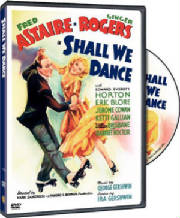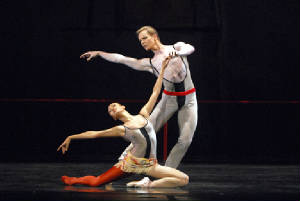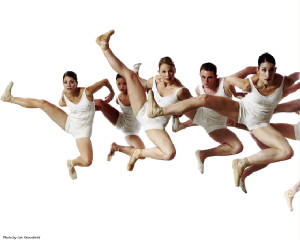
|

|
 |
 |
|

|
|
|
__________
Popular Videos
and
DVDs Lists:
___________

|
|
 |
 |
 |
 |
|
SAN FRANCISCO BALLET ANNOUNCES 2007 REPERTORY SEASON
|
|
|

|
| Tina LeBlanc and Joan Boada. |

Highlights Include the SF Ballet Premiere of Jerome Robbins' Fancy Free
& the World Premiere of Yuri Possokhov's FirebirdSeason Includes One U.S. Premiere, Three World Premieres
& Three SF Ballet Premieres, Plus the Revivals of The Sleeping Beauty and Don Quixote
Program 4 opens on Tuesday, March 13 and includes the encore presentation of Paul Taylor’s
Spring Rounds, the revival of Helgi Tomasson’s Chi-Lin, and the U.S. premiere of Wayne McGregor’s
Eden/Eden. Taylor’s Spring Rounds was commissioned for the Company’s 2005 engagement at the Paris
dance festival, Les étés de la danse de Paris, and is set to the music of Richard Strauss. Tomasson’s Chi-Lin,
a work based on Chinese mythology, was premiered by San Francisco Ballet in 2002. Set to the music of composer Bright Sheng,
the work was called “a gift” by the San Francisco Chronicle upon its premiere. McGregor’s Eden/Eden
was first performed by Stuttgart Ballet in 2005. The work is set to music by Steve Reich, with costume design by Ursula
Bombshell, lighting design by Charles Balfour, and film design by Ravi Deepres.
Program 5 opens on Thursday,
March 15 and includes the revival of Mark Morris’ Pacific, the encore presentations of Jerome Robbins’
Other Dances and Helgi Tomasson’s The Fifth Season, as well as the San Francisco Ballet premiere of Robbins’
Fancy Free. Morris’ Pacific, set to the music of Lou Harrison, was first performed by the Company in 1995
at the UNited We Dance Festival. The work, for five women and four men, was last performed by the Company in 2001. Robbins’
Other Dances had its San Francisco Ballet premiere during the 2006 Repertory Season. Set to the music of Frédéric Chopin
and originally created for Mikhail Baryshnikov and Natalia Makarova, the work debuted at a gala for the Library of Performing
Arts at Lincoln Center, in 1976. Tomasson’s The Fifth Season, set to the music of Karl Jenkins, premiered during
the 2006 Repertory Season and was deemed a “triumph” by the San Francisco Chronicle. Fancy Free,
set to the music of Leonard Bernstein, was premiered by Ballet Theatre (now American Ballet Theatre) in 1944. The work takes
place at a bar, on a summer evening in New York City, and tells the story of three sailors on leave competing for two girls’
attention. It was so popular with audiences that it was made into a stage musical, On the Town, and subsequently, into
a movie starring Gene Kelly.
Program 6 opens on Wednesday, April 4 with the revival of Julia Adam’s Night,
a world premiere by Helgi Tomasson, and the return of Agnes de Mille’s Rodeo. Adam’s Night premiered
in 2000 as part of the Company’s “Discovery Program,” and debuted to critical and popular acclaim. Set to
an original score by Matthew Pierce, Night was last performed by the Company on tour at New York’s City Center
in 2002. Originally premiered by the Ballet Russe de Monte Carlo in 1942, de Mille’s Rodeo is considered an American
classic. Set to the music of Aaron Copland, the work was first performed by San Francisco Ballet in 1989 and was most recently
revived during the Company’s 2006 Repertory Season.
Program 7 opens Wednesday, April 11 and includes
the encore presentation of Lar Lubovitch’s Elemental Brubeck, a world premiere by choreographer Matjash Mrozewski,
and the return of George Balanchine’s Symphony in C. San Francisco Ballet premiered Lubovitch’s Elemental
Brubeck in 2005 at Les étés de la danse de Paris. The commissioned work, called “joyful and dynamic” by Le
Figaro, is set to the music of Dave Brubeck. Matjash Mrozewski, a Toronto-based choreographer, will create his first work
expressly for San Francisco Ballet. Mrozewski formerly danced with a number of companies, including The National Ballet of
Canada and Les Ballets de Monte Carlo, and has created works for Stuttgart Ballet, The National Ballet of Canada, and The
Royal Ballet, among others. Balanchine’s Symphony in C was originally created for the Paris Opéra Ballet in 1947
and had its San Francisco Ballet premiere in 1961. Set to the music of Georges Bizet, the work was last performed by the Company
in 2001 while on tour at the John F. Kennedy Center for the Performing Arts in Washington, D.C.
Program 8 opens
on Saturday, April 28 with the revival of Tomasson/Possokhov’s staging of Don Quixote. Inspired by Miguel de
Cervantes’ book from 1605, the ballet was first performed by the Russian Imperial Ballet at Moscow’s Bolshoi Theatre
in 1869 and included original choreography by Marius Petipa and music by Léon Minkus. San Francisco Ballet premiered the production,
a ballet in three acts, in 2003. Staged by Helgi Tomasson and Yuri Possokhov, the work includes scenic and costume designs
by Jens-Jacob Worsaae and lighting design by Lisa Pinkham. The San Francisco Chronicle hailed it as “[a staging]…that
any company in the world would be proud to call its own.”
During the 2007 Repertory Season, the Company will
perform a total of 56 standard subscription performances. Tuesday and Thursday through Saturday evening performances are at
8 p.m.; Wednesday evening performances are at 7:30 p.m.; Saturday and Sunday matinees are at 2 p.m. The San Francisco Ballet
Orchestra will accompany all programs.
“Meet the Artist” Interviews and “Pointes of View”
Lecture Series
San Francisco Ballet will continue to present the entertaining and informative “Meet the Artist”
series, held in conjunction with the opening night of each program, as well as all Friday evening and Sunday matinee performances.
The thirty-minute interviews with artists, management, and guests of San Francisco Ballet begin one hour prior to performance,
and all ticket holders are invited to attend free of charge. In addition, San Francisco Ballet will present eight free “Pointes
of View” lectures during the season, on select Wednesday evenings. Each lecture will focus on the program to be performed
that evening and is free and open to the public. For more information, call the Ticket Services Office at 415.865.2000.
.

|
| Santa Fe Ballet |
Morphoses/The Wheeldon Company to Highlight
2010 Mondavi Center Dance Performances
January 8, 2009; Davis, California —The internationally renowned Morphoses/The Wheeldon Company, a two-year-old ensemble that has been hailed by The
New York Times as "a dream ballet troupe," makes its Robert and Margrit Mondavi Center for the Performing Arts, UC Davis debut Tuesday, January 26, 2010. The performance, presented as part of the Dance
Series, will begin at 8
p.m. in the Mondavi Center’s Jackson Hall on the UC Davis campus. Tickets are
available from the Mondavi Center Ticket Office at 530.754.2787 or online at MondaviArts.org.
The upcoming California tour of Morphoses/The Wheeldon Company, which includes members of New York City Ballet
and the Royal Ballet of Britain, is a co-presentation by the Mondavi Center, Stanford Lively Arts, San Francisco Performances,
and UC Santa Barbara Arts and Lectures and marks the West Coast debut of this critically acclaimed company. This tour represents
the culmination of over a year’s work, and an unprecedented level of collaboration among the presenting partners, Morphoses
Artistic Director Christopher Wheeldon, and Morphoses Executive Director Lourdes Lopez.
"A tour of this size and complexity is generally arranged by a third party booking agent," said Mondavi Center
Executive Director Don Roth. "In this case the presenting partners, led by the staff of Stanford Lively Arts, took on the
role of tour producers. Through frequent phone and e-mail ‘meetings,’ a block of five performances was booked,
musicians were interviewed and hired, and an agreement was brokered for equal partnership in all tour expenses, from artist
fees to travel and accommodations. It’s an incredible example of working together with true artistic purpose."
The January 26 performance by Morphoses/The Wheeldon Company is just one of several outstanding dance performances
scheduled for the coming months at the Mondavi Center. These include presentations in the Dance, American Movement, Marvels,
and World Stage Dance series.
Spirit of Uganda (January
24; World Stage Dance Series), a talented ensemble of 22 dancers aged 8–18 that acts as ambassadors for Uganda’s 2.4 million orphans,
shares the histories, legends, arts and beliefs of East Africa and introduces some of the new and dynamic music and dance
forms that are being created now. Featuring authentic traditional song and dance and eye-popping costumes, this uplifting
ensemble tours the U.S. annually "invigorating the stage with that elusive thing called joy" (The New York Times).
Ronald K. Brown’s Evidence, A Dance Company (January 30; American Movement Series), a New York-based company and a longtime favorite of UC Davis audiences, returns to
the Mondavi Center as part of its 25th Anniversary Tour. The acclaimed ensemble, which focuses on the seamless fusion of traditional
African dance with contemporary choreography and spoken word, will perform two works. Co-commissioned by the Mondavi Center,
Come Ye celebrates
the life and music of singer Nina Simone; Upside Down, a Brown favorite from 1998, electrified the Mondavi Center audience when EVIDENCE performed it in
2003.
Joe Goode Performance Group (February
24-26; American Movement Series), the San Francisco dance company that’s earned an international reputation for fearless productions that address
some of life’s toughest questions, returns to the Mondavi Center with a program of two works. The new work Wonderboy is a collaboration with puppeteer
Basil Twist, and has been praised as Goode’s "most absorbing, most humanistic effort in many moons" (voiceofdance.com).
The program also includes 29 Effeminate Gestures, a legendary 12-minute solo piece by the award-winning choreographer.
Lyon Opera Ballet (March
2; Dance Series) has
cancelled their 2010 tour. Refunds were issued to ticket buyers in late December.
STREB: Brave (March 21;
Marvels Series), a
breathtaking production featuring seven daredevil dancer-acrobat-gymnasts under the direction of esteemed "extreme action"
choreographer Elizabeth Streb, pursues and exemplifies the concepts of perpetual motion and pure action. With a rotating stage
that constantly changes the performers’ perspective and points of view and an array of circular props, the dancers fly
around the stage "as if the law of gravity had been repealed" (Dance Magazine). Critics have called this unique show a mix of circus, sporting event, and theatrical
spectacular.
Ballet Folklórico de México de Amalia Hernández (March 29; World Stage Dance Series), founded in 1952 by the renowned Mexican choreographer Amalia Hernández, is an internationally
acclaimed 75-member ensemble of dancers and musicians that has toured the world presenting the traditional dances and music
of Mexico. Now led by Hernández’s daughter and grandson, the company that invented "ballet folklórico" presents a visually
spectacular production that the Los Angeles Times describes as "passionate … impeccable … [and] an incomparable spot to enter the richness
of a fabulous culture."
Aspen Santa Fe Ballet (April
9; Dance Series), entering
its 20th year of creative activity, is an ambitious dance company with a European aesthetic grounded in American sensibilities.
The renowned troupe of 12 young dancers, called "a breath of fresh air" by The New York
Times, will perform a revival of Twyla Tharp’s 1975
tribute to the music of Fats Waller, Sue’s Leg. Writing in Dance Magazine, critic Clive Barnes praised the Aspen Santa Fe Ballet as "a model of what a small classic company
should be."
Diavolo (April 11; Marvels Series), a highly acclaimed
dance company founded in 1992 in Los Angeles by choreographer Jacques Heim, first attracted international attention in 1995
at the Edinburgh Festival in Scotland, where it was named "Best of the Fest" by the London
Independent and "Critic’s Choice" by The Guardian. The 10-member company
is comprised of dancers, gymnasts, and actors who create bizarre and surreal worlds on stage and then take athleticism, risk,
and the theater of movement to the extreme.
|
|
 |
 |
|

|

|

|

|

|
| |
|
IFRAMES

|
|
IFRAMES

Modern Dance Stories IFrames
|
|

|

|

|

|

|
 |
 |
|

Josephine Baker
From Wikipedia, the free encyclopedia
Josephine Baker ( June 3, 1906 - April 12, 1975), born Freda Josephine McDonald, was a French dancer, actress and singer. She was given the nicknames "Black Venus," "Black Pearl" and "Creole Goddess." [1]. She renounced her American citizenship in 1937 and became a citizen of France.
|
|
|
 |
 |
 |
 |
Stars Corner:
They are making history NOW!
|
|
|
Buy one bunch of daisies - get the second bunch at half price. For best results, give them plenty of sun, frequent watering,
and regular fertilization.
Contemporary Dance History now being made by:

|
|
 |
 |
 |
 |
One of the Most Exciting:
|
|
|

-
Belly dance
From Wikipedia, the free encyclopedia
(Redirected from Belly dancing)
-
- Oriental dance redirects here. For other forms of dance from the middle east, see Middle Eastern dance.
Belly dance is a Western name for an Arabic style of dance developed in the Middle East. In Europe, it is sometimes called oriental dance. Similarly, In Turkish it is referred to as oryantal dansı ("Dance of the East"). Some American devotees refer to it simply as "Middle
Eastern Dance".
In the Arabic language it is known as raqs sharqi رقص شرقي ("eastern dance") or sometimes
raqs baladi رقص بلدي ("national" or "folk" dance). The term "raqs sharqi" may have originated in Egypt.
The term belly-dance is a creation of Orientalism, and is first attested in English in 1899, translating French danse du ventre.
|
|
 |
 |
|

|

|

